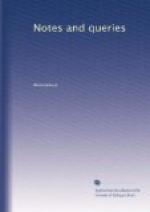George Ormerod.
Sedbury Park, Chepstow.
Omnibuses.—It may be interesting to your readers at a future time to know when these vehicles, the use of which is daily extending, were introduced into this country; perhaps, therefore, you will allow me to state how the fact is. Mr. C. Knight, in his Volume of Varieties, p. 178., observes:
“The Omnibus was tried
about 1800, with four horses and six
wheels; but we refused to
accept it in any shape till we
imported the fashion from
Paris in 1830.”
And Mr. Shillibeer, of the City Road, the inventor of the patent funeral carriage, in his evidence before the Board of Health on the general scheme for extra-mural sepulture, incidentally mentions that he
“Had had much experience
in cheapening vehicular transit, having
originated and established
the Omnibus in England.”—Report,
p. 124., 8vo. ed.
Arun.
Havock.—Havock is a term in our ancient English military laws: the use of it was forbidden among the soldiery by the army regulations of those days; so in the Ordinances des Batailles in the ninth year of Richard II, art. x.:
“Item, que nul soit
si hardi de crier havoick sur peine d’avoir
la teste coupe.”
This was properly a punishable offence in soldiers; havock being the cry of mutual encouragement to general massacre, unlimited slaughter, that no quarter should be given, &c. A tract on “The office of the constable and Mareshall in the tyme of Warre,” contained in the black book of the Admiralty, has this passage:
“Also, that no man be so hardy to crye havock upon peyne that he that is begynner shall be deede therefore: and the remanent that doo the same, or follow, shall lose their horse and harneis ... and his body in prison at the king’s will.”
And this appears to answer well to the original term, which is taken from the ravages committed by a troop of wild beasts, wolves, lions, &c., falling on a flock of sheep. But some think it was originally a hunting term, importing the letting loose a pack of hounds. Shakspeare combines both senses:
“Cry havock! and let slip the dogs of war.”
In a copy of Johnson’s Dictionary before me, I find
“HAVOCK (haroc, Sax.),
waste; wide and general devastation.”
Spenser.
“HAVOCK, interj,
a word of encouragement to slaughter.”
Shakspeare.
“TO HAVOCK, v. a.,
to waste; to destroy; to lay waste.”
Spenser.
Jarltzberg.
Schlegel on Church Property in England.—Fr. Schlegel, in his Philosophy of History, says, p. 403., “in England and Sweden church property remained inviolate:” what the case may be in Sweden I do not know, but it appears strange that a man of such general knowledge as F. Schlegel should make such an assertion as regards England.




